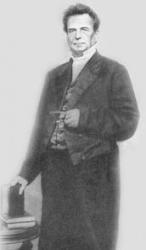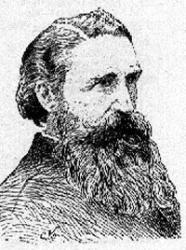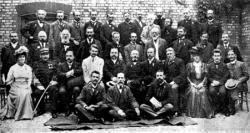Planning worship?
Check out our sister site, ZeteoSearch.org,
for 20+ additional resources related to your search.
- |
User Links
Person Results
John Needham
? - 1786 Author of "He'll Come, The Judge will Surely Come" in The Cyber Hymnal Needham, John, was the son of John Needham, Baptist Minister, of Hitchin, Herts, but the date of his birth is unknown. He would doubtless be educated by his father, who was a tutor and in repute as a learned man. In 1750 Needham became co-pastor with John Beddome at the Baptist meetinghouse in the Pithay, Bristol; but, two years later, Beddome having retired through age, a violent controversy arose in the Church with regard to a continuance of the plan of co-pastorship. As the result, Needham and a number of his friends removed to a Baptist meetinghouse in Callowhill Street, where a Mr. Foot was pastor. For a time the two societies used the same builing at different hours, but in 1755 they were united, with Mr. Needham and Mr. Foot as co-pastors. It is known that up to 1774 this arrangement continued, and it is also known that in 1787, both Mr. Needham and Mr. Foot having died, the Callowhill Street Church became extinct, but which of the two pastors was the survivor is not known. The date of Needham's death is unknown. It was probably circa 1786. In 1768 he published Hymns Devotional and Moral on various Subjects, collected chiefly from the Holy Scriptures, &c, Bristol, S. Farley, 1768. These hymns are 263 in all, and whilst none of them possess great excellence, yet several are of a pleasing and useful character. During the past 120 years several have appeared in Nonconformist hymnbooks, and specially in those of the Baptists. Of these the following are still in common use:—
1. Ashamed of Christ! my soul disdains. Not ashamed of Christ.
2. Awake, my tongue, thy tribute bring. The Divine Perfections.
3. Glory to God, Who reigns above. Jesus, the Messiah.
4. Great author of the immortal mind. Imitation of God's Moral Perfections. From "flow matchless, Lord, Thy glories are."
5. Happy the man whose cautious steps. Christian Moderation.
6. Holy and reverend is the Name. Reverence in Worship.
7. Kind are the words that Jesus speaks. Christ the Strengthener.
8. Lord,ere [Now Lord] the heavenly seed is sown. Parable of the Sower.
9. Methinks the last great day is come. The Judgment.
10. Rise, O my soul, pursue the path. The Example of the Saints.
11. See how the little toiling ant. Youth for Christ.
12. Thou art, O God, a Spirit pure. God a Spirit.
13. To praise the ever bounteous Lord. Harvest.
14. When some kind shepherd from his fold. The Lost Sheep. From this “O how divine, how sweet the joy," in Hatfield's Church Hymn Book, New York, 1872, is taken. [Rev. W. R. Stevenson, M.A.]
--John Julian, Dictionary of Hymnology (1907)
John Needham
Nathaniel Colver

1794 - 1870 Author of "Come, Lord In Mercy Come Again" in The Cyber Hymnal Colver, Nathaniel, D.D., an eminent preacher and abolitionist, born at Orwell, Vermont, 1794, and entered the Baptist Ministry in 1836, becoming successively Pastor at Boston, Detroit, Cincinnati, and Chicago. After the war, in 1865, he founded the Colver Institute at Richmond, Virginia. He died Sept. 25, 1870. In 1848 he contributed 17 hymns to Banvard's Christian Melodist, Boston, U.S; Of these the best known are:—“Come, Lord, in mercy come again," Lent; and " Weep for the lost! thy Saviour wept" (Sympathy), as in the Baptist Praise Book, N. Y., 1871, &c. [Rev. F. M. Bird, M.A.]
--John Julian, Dictionary of Hymnology (1907)
=============================
Colver, Nathaniel. (Orwell, Vermont, May 10, 1794--September 25, 1870), Chicago, Illinois). Baptist. Granville College (Denison University) D.D. 1856. Pastorates at West Clarendon, Vermont, 1819-1821; Fort Covington, New York; Kingsbury, New York; Fort Ann, New York; Union Village, New York, 1834-1838; Holmesburgh, Pennsylvania, 1834; Tremont Temple, Boston, 1839-1852; South Abington, Massachusetts, 1852-1853; Detroit, Michigan, 1853-1856; Cincinnati, Ohio, 1856-1861; Chicago, Illinois, 1861. In 1865, he founded the Colver Institute, which survives in the theology department of Virginia Union University at Richmond, Virginia; became president of the Freedman's Institute, Richmond, Virginia, 1867-1870. He was a founder of the Divinity School of the University of Chicago. He was very active in anti-masonic, anti-slavery, and temperance movements. He authored the hymn "While the earth is clad in darkness," which was the first hymn sung at his installation in Boston, September 15, 1839. He also wrote "Great God, before thy revered name, Within these ransomed walls we bow," which was sung at the dedication of Tremont Temple (formerly Tremont Theatre) on December 7, 1843. He is the author of the Lenten hymn, "Come, Lord, in mercy come again, with thy converting power," which, along with sixteen other of his hymns, appeared in the Christian Melodist which was compiled by Joseph Banvard in 1848. He contributed five hymns to Ocean Melodies (1849), a collection of hymns compiled by Phineas Stowe for seamen. He also wrote the hymn "Weep for the lost! thy Savior wept O'er Salem's hapless doom" which appeared in the Baptist Praise Book in 1871. See J. A. Smith, Memoir of Rev. Nathaniel Colver, D.D. (1873).
--Scotty Wayne Gray, DNAH Archives
Nathaniel Colver
James Merrick
1720 - 1769 Person Name: James Merrick, 1720-1769 Author of "God Bids, And Lo!" in The Cyber Hymnal Merrick, James , M.A., was born in 1720, and educated at Oxford, where he became a Fellow of Trinity College. He entered Holy Orders, but his health would not admit of parish work. He died at Reading, 1769. His publications include:—
(1) Messiah, a Divine Essay. Humbly dedicated to the Reverend the Vice-Chancellor of the University of Oxford and the Visitors of the Free School in Reading. By James Merrick, Ætat. 14, Senior Scholar of the School at their last Terminal Visitation, the 7th of October, 1734. Reading. (2) The Destruction of Troy. Translated from the Greek of Tryphiodorus into English Verse, with Notes, &c. 1742. (3) Poems on Sacred Subjects. Oxford . 1763. (4) The Psalms of David Translated or Paraphrased in English Verse. By James Merrick, M.A., late Fellow of Trinity College, Oxford. Reading. J. Carnan and Co. 1765. 2nd ed. 1766. A few only of these paraphrases were divided into stanzas. In 1797 the Rev. W. D. Tattersall pulished the work "Divided into stanzas for Parochial Use, and paraphrased in such language as will be intelligible to every capacity . . . with a suitable Collect to each Psalm from the Works of Archbishop Parker."
Merrick's paraphrases, although weak and verbose, were in extensive use in the early part of the present century, both in the Church of England and with Nonconformists. They have, however, fallen very much into disuse. Those in modern hymn-books, mainly in the form of centos, include:—
1. Blest Instructor, from Thy ways. Ps. xix.
2. Descend, O Lord! from heaven descend. Ps. cxliv. (In time of National Peril.)
3. Far as creation's bounds extend. Ps. cxlv.
4. God of my strength, the wise, the just. Ps. xxxi.
5. He who with generous pity glows. Ps. xli.
6. How pleasant, Lord.Thy dwellings are. Ps. lxxxiv.
7. Lift up your voice and thankful sing. Ps. cxxxvi.
8. Lo, my Shepherd's hand divine. Ps. xxiii.
9. Lord, my Strength, to Thee I pray. Ps. xxviii.
10. My heart its noblest theme has found. Ps.xlv.
11. O let me, [gracious] heavenly Lord extend. Ps. xxxix.
12. O turn, great Ruler of the skies. Ps. li.
13. Praise, O praise the Name divine. Ps. cl.
14. Sing, ye sons of [men] might, O sing. Ps. xxix.
15. Teach me, O teach me, Lord, Thy way. Ps. cxix.
16. The festal morn, my [O] God, is come. Ps. cxxii, (Sunday Morning.)
17. The morn and eve Thy praise resound. Ps. lxv. (Harvest.)
18. To Thy pastures, fair and large. Ps. xxiii.
From his Poems on Sacred Subjects, 1763, the following centos have also come into common use: --
19. Author of good, to Thee we turn. Resignation.
20. Eternal God, we look to Thee. Resignation.
21. 'Tis enough, the hour is come. Nunc Dimittis.
John Julian, Dictionary of Hymnology (1907)
James Merrick
John William Hewett
1824 - 1886 Person Name: John W. Hewett Translator (from Latin) of "Jesu, Our Lenten Fast of Thee" in The Cyber Hymnal Hewett, John William, M.A., was born in 1824, and educated at Trinity College, Cambridge (B.A. 1849, M.A. 1852). From 1849 to 1852 he was a Fellow of St. Nicolas College, Shoreham; and subsequently he was Head Master of Bloxham Grammar School (1853-56), and Senior Classical Master in the North London College School (1874-78). He has also held curacies in London and the neighbourhood. He edited The Sealed Copy of the Prayer Book, 1848, and other works, and is the author of History and Description of Exeter Cathedral; and another of Ely. His original hymns and translations appeared in his Verses by a Country Curate 1859. From this work the following hymns have come into common use:—
1. In the Name of God the Father. Holy Communion. The 2nd stanza begins,"Lo in wondrous condescension," and the 3rd, "Here in figure represented."
2. Jesu, now Thy new-made soldier. After Holy Baptism.
3. What time the evening shadows fall. SS. Simon & Jude.
4. Withdraw from every human eye. St. Bartholomew.
There are also two translations in Hymns Ancient & Modern, "Jesu, our Lenten fast to Thee," and "O Thou Who dost to man accord," q.v. His Verses contain several good hymns in addition to those named. In addition he contributed a few hymns (all signed by him) to the Lyra Messianica, 1864; and "Jesus, Thy presence we adore" (Communion) to The Eucharistic Hymnal, 1877.
-- John Julian, Dictionary of Hymnology
John William Hewett
Paul Henkel
Person Name: Paul B. Henkel Author of "Have Mercy, Lord, On Us, We Pray" in The Cyber Hymnal
Paul Henkel
Archer T. Gurney

1820 - 1887 Author of "The Awful Noontide Gloom Is O'er" in The Cyber Hymnal Gurney, Archer Thompson, was born in 1820, and educated for the legal profession. He was called to the Bar at the Middle Temple, but in 1849 he entered Holy Orders. He held several appointments, including the Curacy of Buckingham, 1854-58; the Chaplaincy of the Court Church, Paris, 1858-71, and other charges. He died at Bath, March 21, 1887. His published works include:—
Spring, 1853; Songs of the Present, 1854; The Ode of Peace, 1855; Songs of Early Summer, 1856; and A Book of Praise, 1862.
To the Book of Praise he contributed 147 hymns. Very few of these are known beyond his own collection. He is widely known through his Easter hymn “Christ is risen, Christ is risen." His "Memory of the blest departed" (SS. Philip and James) is in the People's Hymnal, 1867.
-- John Julian, Dictionary of Hymnology
Archer T. Gurney
Louisa Frederica Adela Schafer

b. 1865 Person Name: Adela Ŝefer Translator of "En lando malproksime for" in TTT-Himnaro Cigneta Louisa Frederica Adela Schafer, British Esperantist, solo vocalist, and foreign-language teacher, born February 11, 1865, was a prolific early translator of English songs, sacred and secular, into Esperanto. She generally published her texts under the Esperanto respelling and abbreviation of her name "Ad. Ŝefer". Four of her texts are in Adoru Kantante, and one survives in Adoru. She was a member of the prestigious "Lingva Komitato" from 1907. The year of her death is not known.
Louisa Frederica Adela Schafer
Anita González
b. 1920 Person Name: Anita González, 1920- Translator of "A Solas en Getsemaní" in Himnario Metodista
Anita González


 My Starred Hymns
My Starred Hymns


